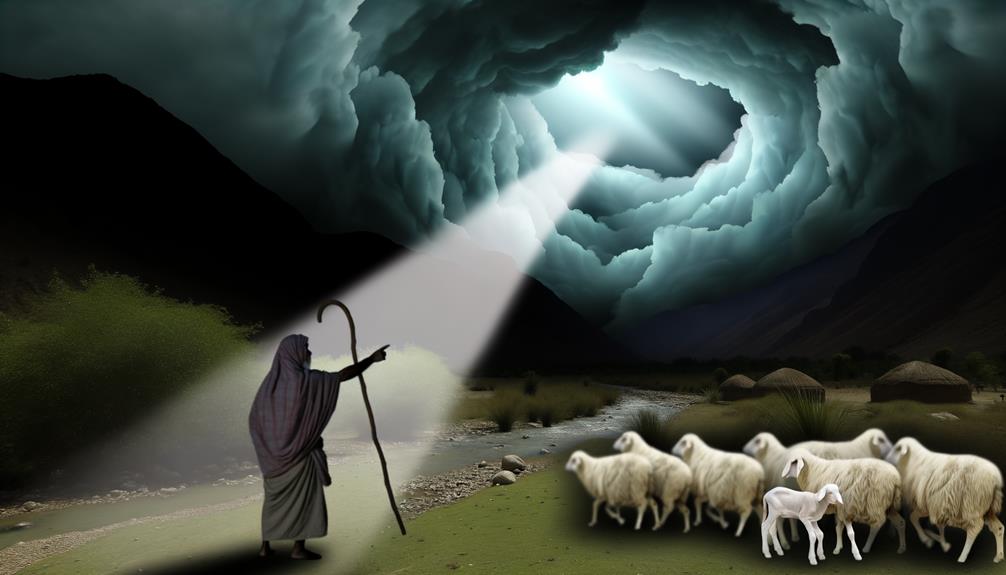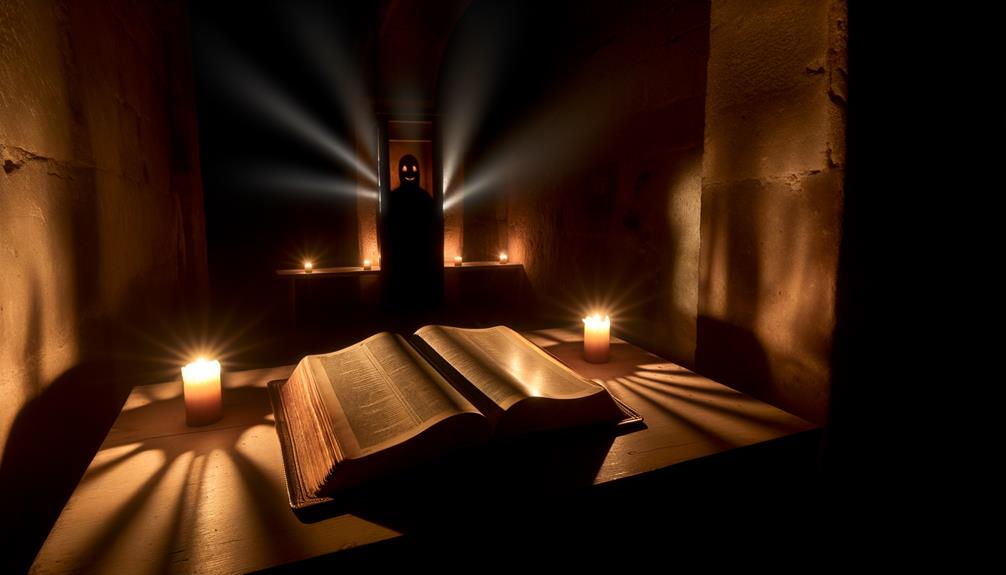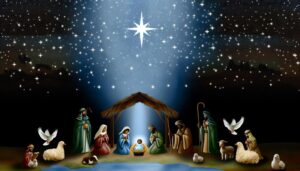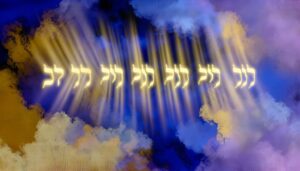Fear No Evil Bible Verse Meaning: God’s Protection
Psalm 23:4, originating from King David, conveys profound theological assurance to believers. Set against the backdrop of ancient Israel, this verse’s declaration, “I will fear no evil,” symbolizes divine protection and confronts spiritual fear with faith.
The metaphorical “valley of the shadow of death” highlights life’s perilous moments, while the “rod and staff” represent God’s comforting authority. It’s a call to transform fear into resilient faith, grounding oneself in divine truths and protection.
By immersing in this scripture, one gains insight into transcending adversities through trust in God’s unwavering presence. Consider how this verse has inspired historical figures.

Fear No Evil Bible Verse: Psalm 23:4 Meaning and Key Themes
| Aspect | Details |
|---|---|
| Verse Text | “Even though I walk through the valley of the shadow of death, I will fear no evil, for you are with me; your rod and your staff, they comfort me.” |
| Biblical Context | Part of Psalm 23, attributed to King David, expressing reliance on God as a shepherd. |
| Key Themes | Trust in God, courage in adversity, and divine protection. |
| Symbolism | “Valley of the shadow of death” symbolizes life’s trials; “rod and staff” represent guidance and comfort. |
| Spiritual Insights | Emphasizes faith in God’s presence during difficult and fearful situations. |
| Practical Application | Provides encouragement to overcome fear and challenges with faith in God’s guidance. |
| Modern Relevance | A source of comfort and strength for those facing life’s uncertainties and hardships. |
Origin of Psalm 23:4

Psalm 23:4, frequently cited for its comforting message, is a verse that has its origins in the ancient Hebrew scriptures, attributed to King David.
This verse, part of a larger psalm, employs pastoral imagery to convey a profound spiritual truth. In saying, ‘Even though I walk through the valley of the shadow of death, I will fear no evil,’ David draws on his experiences as a shepherd, a role imbued with protective responsibility.
The verse’s syntax and diction suggest a deep trust in divine providence, reflecting a theological assertion that God’s presence dispels fear.
Through its poetic structure, Psalm 23:4 transcends its historical milieu to offer timeless solace, emphasizing unwavering faith amidst life’s adversities.
Historical Context

Understanding the historical context of Psalm 23:4 necessitates an exploration of the sociopolitical and religious landscape of ancient Israel during King David’s reign. This period, approximately the 10th century BCE, was marked by significant consolidation of the tribal confederation into a unified monarchy.
Under David’s leadership, Israel experienced military victories, territorial expansion, and the establishment of Jerusalem as the political and spiritual center. The religious climate was deeply rooted in Yahwistic worship, emphasizing God’s covenantal relationship with His people.
David, a shepherd by profession before becoming king, often employed pastoral imagery to convey divine protection and providence. This historical backdrop enriches the verse, casting it as a reflection of faith amidst the tumultuous and often perilous circumstances of Davidic Israel.
Literary Analysis

In examining the literary structure of Psalm 23:4, one observes how the verse employs metaphorical language to evoke themes of divine guidance and protection. The verse, ‘Even though I walk through the valley of the shadow of death, I will fear no evil,’ utilizes powerful imagery to convey a sense of peril and the reassurance of God’s presence.
The literary devices employed include:
- Metaphor: “Valley of the shadow of death” symbolizes extreme danger or despair.
- Parallelism: The balance in structure emphasizes the contrasting states of fear and trust.
- Symbolism: “Rod and staff” signify comfort and divine authority.
This meticulous use of language fosters a profound connection between the reader and the divine promise of protection.
Theological Insights

The theological implications of ‘Fear no evil‘ encompass profound assurances of divine protection, revealing God’s omnipresence as a bulwark against spiritual fear.
This verse also underscores the transformative power of faith, which empowers believers to confront and transcend their deepest anxieties.
Divine Protection Assurance
Divine protection, as articulated in the Bible, offers a profound assurance to believers, emphasizing that God’s omnipresence and omnipotence serve as a shield against the forces of evil. This theological concept underscores several key aspects:
- Omnipresence: God’s presence is all-encompassing, offering constant vigilance over believers.
- Omnipotence: His infinite power guarantees that no evil can prevail against His will.
- Covenantal Promise: Scriptures affirm that God’s promises are unwavering, providing a foundation for trust.
These elements collectively affirm a believer’s confidence in divine safeguarding, fostering an environment where trust in God’s protection transcends fear.
This theological perspective invites deeper reflection on the nature of God’s providence.
Overcoming Spiritual Fear
Building upon the assurance of divine protection, believers are equipped to overcome spiritual fear by grounding themselves in theological truths that affirm God’s sovereignty and unwavering support.
Central to this is the understanding that God’s omnipotence and omnipresence provide a foundation for security.
Scriptural affirmations, such as Romans 8:38-39, underscore that nothing can separate believers from the love of God.
Moreover, the Psalms repeatedly illustrate that trusting in God transforms fear into faith.
Theologically, this implies that spiritual fear is mitigated through an intimate relationship with God, where His promises are internalized and His presence is continually acknowledged.
Understanding these truths cultivates resilience, enabling believers to navigate spiritual trials with confidence and peace.
Faith Empowerment Principles
Grounded in theological insights, faith empowerment principles emphasize the transformative power of divine truth in the believer’s life. These principles are not mere abstract concepts but are deeply rooted in scriptural affirmations and the lived experiences of faith communities. Understanding these principles can fortify one’s spiritual resilience against fear and anxiety.
Key elements include:
- Scriptural Foundation: Anchoring faith in biblical promises guarantees spiritual stability.
- Divine Presence: Recognizing God’s omnipresence provides comfort and courage.
- Community Support: Engaging with a faith community fosters mutual encouragement and accountability.
These elements collectively empower believers to confront and overcome fear with unwavering faith, reflecting the core message of ‘Fear No Evil.’
Symbolism of Evil

The symbolism of evil in biblical texts often juxtaposes darkness and light, illustrating the perennial struggle between good and evil.
This dichotomy serves not only as a moral framework but also as a spiritual guide, offering believers a clear distinction between righteousness and sin.
Analyzing these symbols within the context of ‘Fear No Evil‘ elucidates how faith can empower individuals to transcend the perils of malevolence.
Darkness and Light
Symbolism of darkness and light in biblical texts often serves to represent the dichotomy between evil and good, offering a profound insight into the moral and spiritual dimensions of human existence. This contrast is not merely aesthetic but deeply theological, reflecting the nature of divine truth and moral clarity.
Darkness: Often symbolizes ignorance, sin, and separation from God.
Light: Represents knowledge, righteousness, and the presence of God.
Psalm 23:4: ‘Even though I walk through the darkest valley, I will fear no evil, for you are with me’ highlights divine guidance amid adversity.
John 8:12: ‘I am the light of the world. Whoever follows me will never walk in darkness’ underscores the salvific power of Christ.
Understanding these symbols aids believers in maneuvering life’s moral complexities.
Good Vs. Evil
In biblical literature, the concept of evil is frequently symbolized through imagery and narrative that underscore its corrupting influence and opposition to divine will.
This symbolic representation manifests through various forms such as darkness, serpents, and the figure of Satan. Each symbol serves to illustrate the antithesis of God’s goodness and love.
For example, darkness often signifies ignorance and separation from God, while serpents represent deceit and rebellion, as seen in the Genesis account of the Fall. The figure of Satan embodies ultimate rebellion against divine authority.
These symbols collectively emphasize the pervasive and insidious nature of evil, reinforcing the necessity of divine guidance and moral integrity to overcome such malevolent forces.
Understanding these symbols enhances comprehension of the scriptural call to ‘fear no evil.’
Personal Applications

Applying the verse ‘Fear no evil’ to personal life involves cultivating a deep, unwavering trust in divine protection and guidance amidst life’s adversities. This biblical assurance can be integrated into daily existence by:
Embracing prayer and meditation: Regularly seeking spiritual connection to reinforce faith.
Reflecting on scripture: Consistent study of biblical texts to internalize God’s promises.
Practicing gratitude: Maintaining a thankful heart as a countermeasure to fear and anxiety.
Engaging in community: Participating in faith-based groups to gain support and share experiences.
Modern Interpretations

Modern interpretations of the verse ‘Fear no evil‘ often reflect a nuanced understanding of its relevance to contemporary challenges and spiritual resilience. Scholars and theologians emphasize its applicability to modern anxieties, such as economic instability, social injustice, and global crises.
The verse is seen not merely as a historical or doctrinal statement but as a timeless assurance of divine protection and inner strength. By invoking this verse, believers are encouraged to cultivate a steadfast faith that transcends temporal fears.
This perspective underscores a holistic approach to spirituality, advocating for a trust in divine providence that empowers individuals to confront modern adversities with courage and hope. Such interpretations foster a profound sense of security and purpose in an ever-changing world.
Inspirational Stories

Throughout history, countless inspirational stories have illustrated the profound impact of the ‘Fear no evil’ verse on the lives of individuals facing formidable challenges. These narratives underscore the verse’s potential to provide solace and courage in dire circumstances.
Analyzing these accounts reveals a recurring theme: unwavering faith in divine protection.
- Corrie ten Boom: Survived Nazi concentration camps, attributing her resilience to Psalm 23:4.
- Martin Luther King Jr.: Drew strength from this verse during his civil rights activism.
- Mother Teresa: Found comfort in her mission amidst the suffering of Calcutta.
These stories reflect the verse’s transformative power, offering hope and steadfastness in the face of adversity.
Conclusion
The phrase ‘fear no evil‘ from Psalm 23:4, emerging from a rich historical and theological context, transcends its literary origins to offer profound spiritual comfort.
Coincidentally, its enduring relevance across diverse cultures and epochs underscores its universal appeal.
Through a nuanced understanding of its symbolism and modern interpretations, this verse continues to inspire resilience and faith. Its themes of humility and perseverance resonate deeply, encouraging individuals to remain steadfast in the face of adversity. Additionally, exploring the phrase ‘haughty eyes meaning in the bible‘ reveals a caution against pride and arrogance, emphasizing the importance of a grounded perspective in our spiritual journeys.
Consequently, ‘fear no evil’ remains a symbol of the timeless intersection of divine assurance and human endurance.






